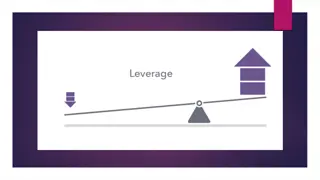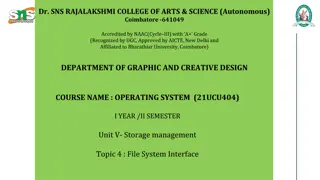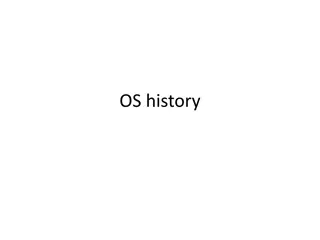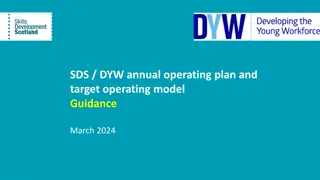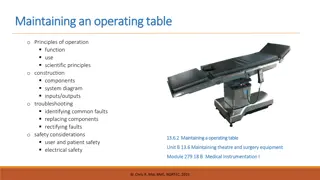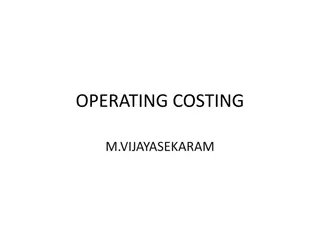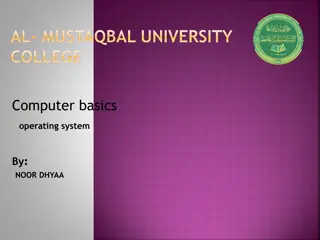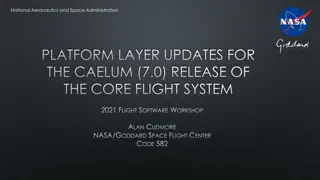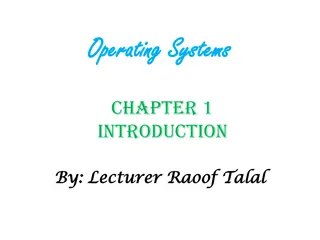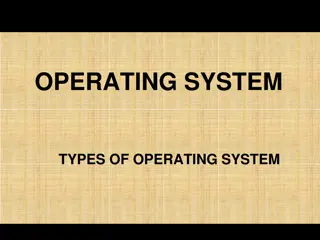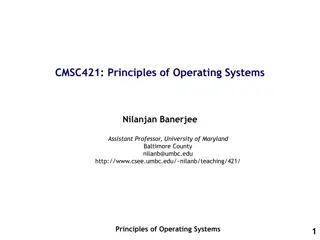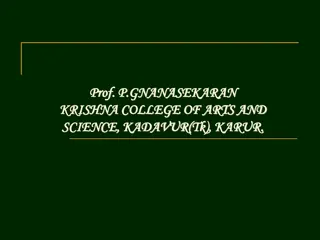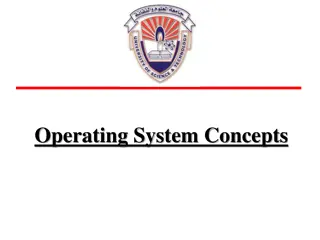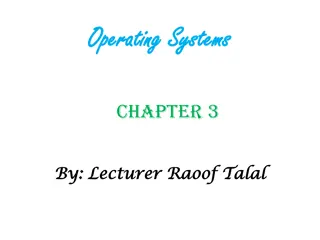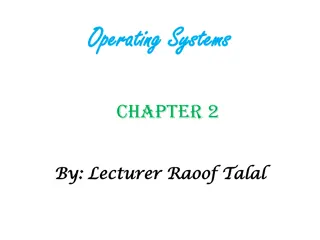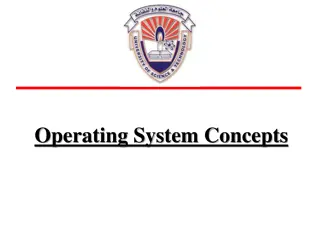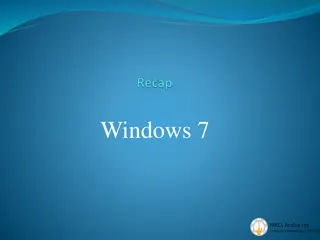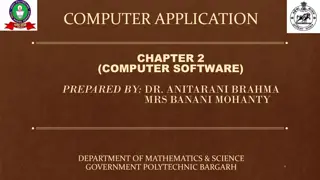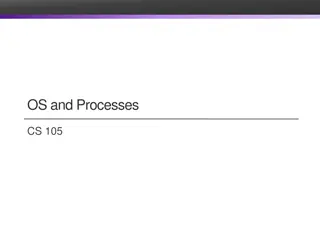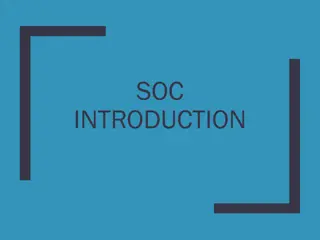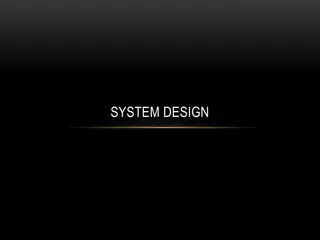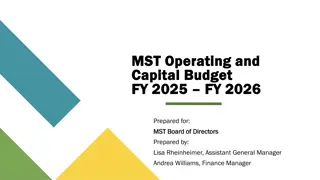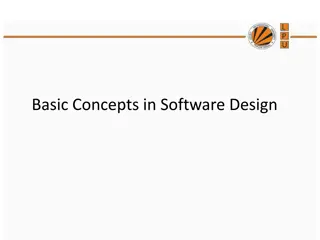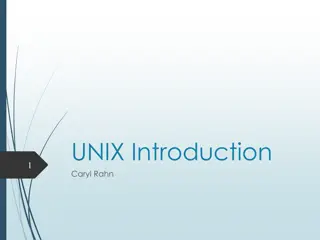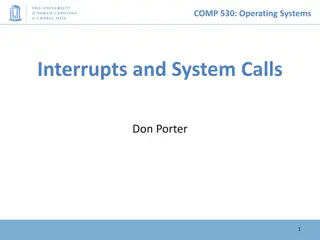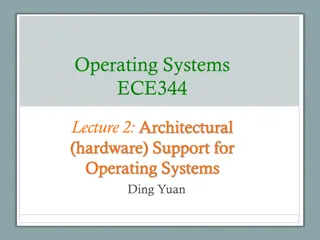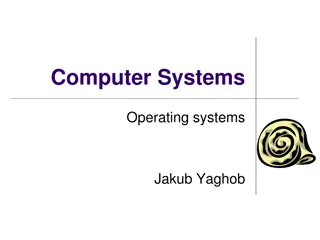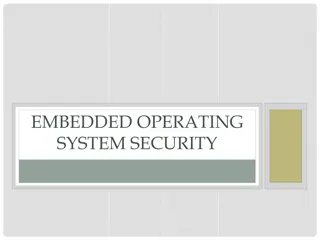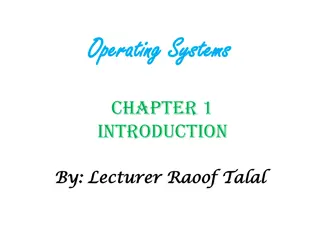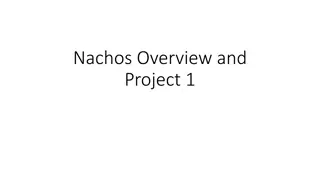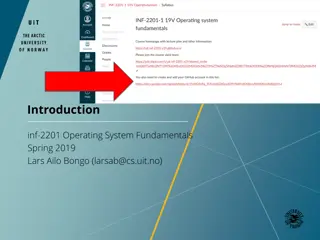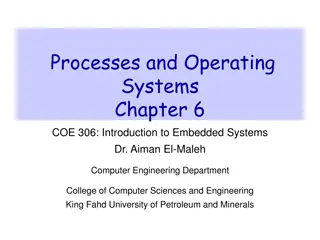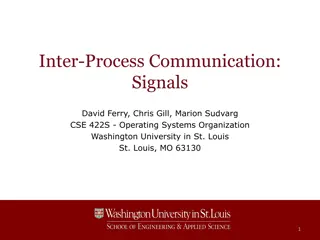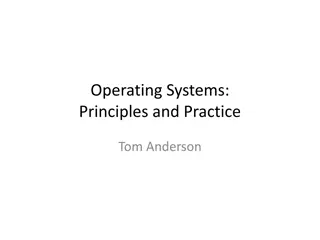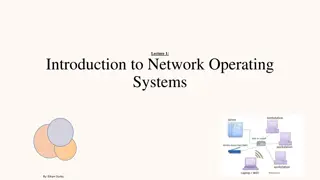Understanding Leverage and Operating Leverage in Financial Management
Leverage in financial management refers to using assets or funds with fixed costs to analyze the impact of debt and equity mix on shareholder returns and risk. Operating leverage focuses on leveraging fixed operating costs to amplify profit changes with sales variations, measured by the degree of op
2 views • 6 slides
Operating Systems
An operating system is a crucial program that manages all other programs on a computer. It handles tasks like input recognition, file management, and device control. There are different types of operating systems such as single-user, single-task systems, multi-user, multi-task systems, real-time ope
6 views • 11 slides
Understanding File System Interface in Operating Systems
The file system interface is a crucial aspect of any operating system, providing users with a method for storage and access to data and programs. It comprises files for data storage and a directory structure for organizing and managing files within the system. File attributes like name, identifier,
0 views • 8 slides
Evolution of Operating Systems: From Mainframe Computers to Unix
Before the 1950s, users interacted directly with mainframe computers without an operating system, debugging using control panels. The transition to writing programs in symbolic languages led to the need for specific drivers. Run queues and operator-assisted job submissions marked this era. The first
0 views • 41 slides
SDS/DYW Annual Operating Plan and Target Operating Model Guidance - March 2024
This guidance outlines the development of an Annual Operating Plan and Target Operating Model (TOM) to enhance collaboration and improve outcomes for young people. It emphasizes aligning planning activities, co-designing learner experiences, and maximizing collective resources through strategic part
1 views • 9 slides
Maintaining an Operating Table: Principles and Functions
An operating table system comprises three components - the table column, table top, and transporter, each available in different versions for various surgical disciplines. Stationary tables are anchored to the floor, offering flexibility to adapt to patient needs. Mobile tables provide maneuverabili
0 views • 12 slides
Understanding Operating Costing in Service Industries
Operating costing is a method utilized by service-oriented businesses to ascertain the costs of providing services. Industries such as transportation services, welfare services, utility suppliers, and municipal services find operating costing beneficial. The method involves classifying costs into th
0 views • 6 slides
Understanding Operating Systems: Basics and Types
An operating system is essential software that manages a computer's hardware and software, allowing users to interact with the computer. Learn about the functions of an operating system, its importance, types available such as Microsoft Windows and macOS, and how they impact different devices. Disco
1 views • 11 slides
NASA Platform Layer Updates for the CAELUM (7.0) Release
The National Aeronautics and Space Administration (NASA) discusses platform layer updates for the CAELUM (7.0) release of the Core Flight System in the 2021 Flight Software Workshop. The platform layer consists of the Operating System Abstraction Layer (OSAL) and Platform Support Package (PSP), whic
1 views • 20 slides
Understanding Operating Systems: Introduction and Functions
An operating system plays a crucial role in managing computer hardware and facilitating user-computer interactions. It serves as an intermediary between users and hardware components, ensuring efficient resource allocation and control. The operating system coordinates the use of hardware resources b
5 views • 16 slides
Understanding Different Types of Operating Systems
An operating system is the crucial program that manages a computer's resources and acts as an interface between the user and the machine. Various types of operating systems exist, including real-time, multi-user vs. single-user, multi-tasking vs. single-tasking, distributed, and embedded systems. Re
1 views • 11 slides
Software Engineering Design Principles and Concepts
The chapter discusses the essential principles and concepts in software design, highlighting the four key design models - data design, architectural design, interface design, and component-level design. It emphasizes the importance of traceability to the analysis model, minimizing the gap between so
0 views • 36 slides
Fundamentals of Operating Systems Explained
Explore the core concepts of operating systems, including kernel-userspace interactions, system calls, context switching, and virtual memory management. Delve into x86 assembly for system calls, hardware interrupts, and the flow of control during system call invocations. Gain insights into key compo
7 views • 19 slides
Understanding Operating Systems: Functions and Evolution
Operating systems are essential software that enable computers to function effectively by managing hardware resources and facilitating communication between applications and hardware. This article covers the basics of operating systems, their structure, evolution, functions, and types. It also explo
2 views • 23 slides
Understanding Operating System Concepts: Lecture Overview and Services
Exploring the lecture content on operating system concepts, structures, services, system calls, and file manipulation. Delve into the importance of operating system services, error detection, program execution, I/O operations, protection, security, and resource allocation in operating systems. Learn
4 views • 26 slides
Understanding File Concepts in Operating Systems
In the realm of operating systems, files are vital entities that store data in secondary storage. They consist of attributes like name, size, protection, and more. File operations such as creation, writing, and reading are performed through system calls. This chapter delves into the intricacies of f
12 views • 21 slides
Understanding Operating System Services and Functions
An operating system provides services for both users and programs, including user interfaces, program execution, I/O operations, file-system manipulation, communication between processes, error detection, resource allocation, accounting, and protection/security measures. These functions ensure effic
5 views • 15 slides
Understanding Deadlock Avoidance in Operating System Concepts
Deadlock Avoidance is a critical concept in operating system design to prevent system resources from entering a deadlock state. By requiring additional information about resource requests and utilizing algorithms like the banker's algorithm, systems can dynamically allocate resources to avoid circul
1 views • 29 slides
Understanding Operating Systems: Key Concepts Explained
Explore fundamental concepts related to operating systems, such as application interaction, booting processes, system functions, and user control settings. Dive into topics like system interfaces, computer restart terminology, and desktop environment familiarity. Enhance your knowledge on how operat
0 views • 51 slides
Understanding Computer Software and Operating Systems
Computer software, comprising system software and application software, plays a crucial role in managing computer resources and facilitating user instructions. System software consists of control programs, support programs, and development programs, while application software assists in specific tas
1 views • 26 slides
Introduction to Operating Systems and Processes
In this informative content, we delve into the fundamental concepts of operating systems (OS) and processes. Operating systems are essential software that manage a computer's resources for users and applications. We explore the core functionalities of an OS, such as resource allocation, isolation, c
0 views • 41 slides
Understanding System on Chip (SoC) Design and Components
Explore the world of System on Chip (SoC) design, components, and working flow. Learn about Intellectual Properties (IP), platform-based design, typical design flows, top-down design approach, and the emerging Electronic System Level (ESL) design flow. Discover the essential components of an SoC, su
0 views • 45 slides
Understanding Programs and Processes in Operating Systems
Exploring the fundamental concepts of programs and processes in operating systems, this content delves into the definitions of programs and processes, the relationship between them, the components of a program, what is added by a process, and how processes are created. The role of DLLs, mapped files
0 views • 22 slides
Comprehensive Guide to System Design Components and Techniques
System design involves the detailed planning and identification of components in an information system, aiming to provide users with a general understanding of the new system. This process includes techniques like flowcharts, prototyping, and component design, covering aspects such as output design,
0 views • 24 slides
MST Operating and Capital Budget FY 2025 Summary
The MST Operating and Capital Budget for FY 2025 focuses on maximizing revenues, increasing bus advertising rates, promoting transit services, seeking grants for capital projects, and maintaining stable staffing levels. The budget priorities also include operating a Better Bus Network at Board-adopt
0 views • 10 slides
Understanding Basic Concepts in Software Design
Software design involves transforming customer requirements into a form suitable for implementation, with activities categorized into preliminary and detailed design stages. High-level design focuses on module identification and control relationships, while detailed design entails defining data stru
1 views • 24 slides
Understanding UNIX Operating System
UNIX is a versatile operating system that enables multi-user access, multitasking, and portability across various computing environments. It serves as the foundation for many modern operating systems and has influenced concepts incorporated in Microsoft Windows and DOS. The UNIX system comprises dis
0 views • 51 slides
Understanding Operating System Interrupts and System Calls
Explore the fundamentals of operating system interrupts and system calls in COMP.530. Learn about synchronous and asynchronous interrupts, control flow handling, and the hardware tools available for irregular control flow. Delve into the key building blocks of operating systems such as context switc
0 views • 30 slides
Architectural Hardware Support for Operating Systems in ECE344 Lecture
The lecture discusses the importance of hardware support in operating systems, emphasizing the management of hardware resources and providing a clear interface to programs. It explores the fundamental relationship between operating system functionality and hardware, highlighting how hardware support
0 views • 53 slides
Understanding Computer Systems and Operating System Architectures
An exploration of computer systems and operating system architectures, covering topics such as CPU modes, monolithic and layered architectures, microkernel architecture, Linux and Windows kernel architectures, as well as devices and their terminology. The content delves into the roles, structures, a
0 views • 57 slides
Introduction to Linux: Course Overview and Objectives
This introduction to Linux course provides a comprehensive overview of operating systems, including the history, variations, user interface, and essential commands. The course is designed with lectures, labs, and exercises to help participants gain a better understanding of Linux and its practical a
0 views • 77 slides
Understanding Embedded Operating System Security
Embedded operating systems are designed for special purposes with limited resources and small sizes, found in various devices like ATMs, smartphones, cars, and more. Common operating systems include VxWorks, Windows, QNX, and SCADA, with different applications and requirements. Windows CE stands out
0 views • 21 slides
Understanding Operating Systems: An Introduction and Overview
An operating system is a crucial program that manages computer hardware and serves as an intermediary between users and hardware. This chapter explores the role of operating systems in a computer system, covering components like hardware, application programs, and users. It delves into how operating
0 views • 16 slides
Understanding Nachos Operating System Development Project
Nachos is instructional software for teaching operating systems courses. This project guide covers the installation on Ubuntu, debugging, and fixing issues in Project 1 related to program execution. Learn to trace code, fix bugs, and modify Nachos to support multiprogramming. Submit your report by t
0 views • 7 slides
Exploring Operating System Fundamentals: An Overview
Delve into the world of operating systems with a comprehensive exploration of key concepts, historical developments, and emerging challenges. Understand the importance of studying operating systems in gaining insights into computer functionality and system abstraction levels. Discover a wealth of re
0 views • 25 slides
Introduction to Processes and Operating Systems in Embedded Systems
Processes and operating systems play a crucial role in building complex applications on microprocessors, offering flexibility to meet timing requirements. The operating system (OS) manages processes by providing mechanisms for switching execution between them. Real-Time Operating Systems (RTOS) are
0 views • 65 slides
Understanding Inter-Process Communication Signals in Operating Systems
Signals in operating systems play a critical role in facilitating asynchronous notifications between processes. They allow for event-based programming and are conceptually similar to hardware interrupts and exceptions. Processes can handle signal delivery by ignoring it, terminating, or invoking a s
0 views • 24 slides
Understanding Operating Systems: Principles and Practice in CSE Curriculum
Dive into the world of operating systems through the lens of "Operating Systems: Principles and Practice" by Tom Anderson. Discover how this course fits in the UW CSE curriculum, covering systems programming, operating system interfaces, and distributed systems. Explore the project work on building
0 views • 21 slides
An Overview of Network Operating Systems and Multitasking
This informative content discusses the services of network operating systems, multitasking concepts, essential components, client and server software elements, and network services. It explains the two forms of multitasking - preemptive and nonpreemptive - and their functions within operating system
0 views • 48 slides
Overview of Network Operating Systems and Their Features
Network operating systems are essential software that manage computer resources and provide services for programs. This lecture covers the types of computers in a network, features of operating systems such as process and memory management, disk and file systems, and networking capabilities. Underst
0 views • 27 slides
